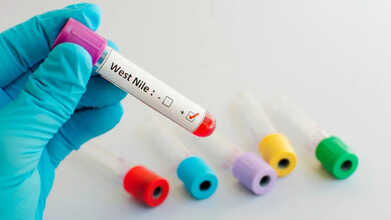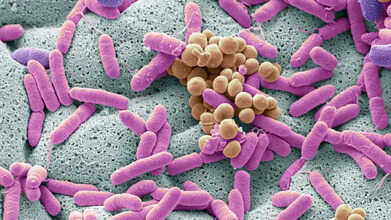- Health Conditions A-Z
- Health & Wellness
- Nutrition
- Fitness
- Health News
- Ayurveda
- Videos
- Medicine A-Z
- Parenting
- Web Stories
Meet The 14-Year-Old Genius Behind An AI That Can Detect Heart Disease Within 7 Seconds

At just 14 years old, Siddharth Nandyala is already changing the face of modern medicine. A native of Anantapur in Andhra Pradesh in India, living in Frisco, Texas, this young genius is causing global waves with the development of CircadiaV, a revolutionary AI-powered mobile app that can diagnose heart disease within a record seven seconds. With nothing more than a smartphone and sophisticated machine learning, Siddharth's invention has the potential to transform cardiovascular disease screening—one of the globe's top causes of death.
With certification from international tech giants such as Oracle and ARM, Siddharth is officially the world's youngest AI-certified professional but behind the titles and accolades, it's his vision for affordable, early healthcare interventions that really sets him apart. While most teenagers are at the age playing around with social media and video games, Siddharth is addressing medical challenges on a global scale.
Heart disease remains the primary cause of death in the world, resulting in more than 17.9 million deaths annually, as reported by the World Health Organization (WHO). A significant portion of those deaths are avoidable if diagnosed early enough. Unfortunately, the absence of medical diagnostic infrastructure in remote and underprivileged regions—particularly in developing nations—is an enormous challenge.
How CircadiaV Works?
What sets CircadiaV apart is its non-invasive, fast, and precise method for early detection of heart disease. The app can capture heart sounds by holding a smartphone against a patient's chest. It removes ambient noise, analyzes the audio data through a cloud-based machine learning model, and provides results in seven seconds.
The program can identify various cardiac anomalies, such as:
- Arrhythmias (irregular heartbeats)
- Early indications of heart failure
- Indicators of coronary artery disease
- Abnormalities in the heart valves
And it's amazingly precise—with a detection accuracy of more than 96%, as confirmed through testing on over 15,000 patients in America and another 700 in India, including at the Guntur Government General Hospital (GGH).
This application does not substitute for the EKG but is used as a quick, scalable pre-screen," Siddharth said to the Smithsonian Magazine. That clarification is important—it is not intended for consumer use at home or consumer diagnostics, but is designed to assist medical personnel, especially in impoverished environments where full cardiac diagnostics might not be within reach.
That is where CircadiaV comes in. Its low-cost, cloud-based, and portable nature makes it a perfect device for community clinics and frontline health workers. The application can be utilized in rural areas to give an early diagnosis, leading to early referrals and possibly cutting long-term morbidity and mortality.
An initial potential diagnosis in patients otherwise unlikely to have had access to medical treatment may in the end save long-term morbidity and mortality from this disease.
That is, this app could literally be a lifesaver—particularly for patients in rural towns, refugee camps, or even wartime zones where cardiologists and expensive diagnostic technology are scarce.
More Than Just a One-Time Invention
Siddharth's foray into innovation had not begun with CircadiaV. Prior to this, he had created a low-cost prosthetic arm, a innovation to enhance mobility for individuals with limb loss in underprivileged communities. He also had started STEM IT, a company that creates science and technology kits for children, enabling experiential STEM learning across socioeconomic barriers.
His success has already seen him receive national and international acclaim, including a Certificate of Recognition from the US House of Representatives and a congratulatory letter from President Joe Biden.
And although he is as old as some of his classmates are young, Siddharth has just become a computer science major at the University of Texas. And his goals don't end there. He hopes to make CircadiaV capable of not just detecting lung diseases like pneumonia and pulmonary embolism, but also of analyzing recordings of lung sounds just like the app presently analyzes heart sound recordings.
Clinically, prompt detection is the key to success with cardiovascular treatment. Most terminal cardiac illnesses—such as congestive heart failure or severe coronary artery disease—are salvageable if detected early. But when symptoms intensify, choices narrow, and survival rates plummet.
By providing healthcare professionals with an advantage with CircadiaV, Siddharth is delivering:
- Earlier detection = quicker decision-making on treatment
- Non-invasive screening guarantees greater uptake in community-based screening
- Cloud-fueled insights enable real-time collaboration among rural clinics and urban hospitals
Consider the following: a community health worker in a remote village in India uses a smartphone to identify early-stage heart failure in a 55-year-old man. Rather than waiting weeks for a cardiology visit, that patient can be expedited for further testing and treatment—saving his life.
The app is particularly useful for terminal heart patients whose survival chances raise significantly if the condition is detected at the asymptomatic or initial phases. With correct warnings regarding the development of arrhythmias or valve malfunctions, the technology enables physicians to act before it is too late.
Johnny Ball Reveals Prostate Cancer Diagnosis; Early Symptoms You Should Know

Credits: Rii Schroer
Children’s TV presenter Johnny Ball spoke openly on Monday’s Good Morning Britain about his prostate cancer diagnosis from 2022. During the ITV show, hosts Ed Balls and Susanna Reid discussed Ball’s health and recovery. The 87-year-old, father of radio host Zoe Ball and well-known for shows like Play School, revealed that he successfully completed treatment and is now in good health.
Reflecting on his experience, Ball said, “I was diagnosed with prostate cancer in August 2022. Thankfully, after three months of daily radiation therapy starting in September, I’m through it and feeling well.” He acknowledged that the disease can be fatal, citing friends who lost their lives to it, including Goon Show star Harry Secombe and comedian Bob Monkhouse. “I’m 20 years younger than them, and I feel fortunate because today we can treat it successfully,” he added.
Ball also stressed the importance of regular check-ups. Despite showing no symptoms, his cancer was discovered during a routine GP visit. His PSA levels were at 30, far above the normal threshold of three, highlighting the value of screening even in the absence of symptoms.
What Is Prostate Cancer?Prostate cancer develops in the prostate, a small gland in the male reproductive system responsible for producing fluid that forms part of semen. The condition occurs when cells in the prostate grow uncontrollably, potentially forming a tumor. While some forms grow slowly and may not immediately threaten health, the cancer can be dangerous if it spreads beyond the prostate. Factors that increase risk include age, genetics, and ethnicity.
What is the Prostate?
The prostate is a small gland located just below the bladder in men. Its primary role is to produce seminal fluid, which helps nourish and transport sperm.
How Does Prostate Cancer Develop?
Cancer in the prostate begins when certain cells start growing abnormally. These cells multiply faster than normal, eventually forming a tumor.
Early Warning Signs Of Prostate Cancer
Prostate cancer often does not cause noticeable symptoms in its early stages. When symptoms do appear, they usually involve changes in urination:
- Frequent urination, especially at night
- Difficulty starting or stopping urine flow
- Weak or interrupted stream
- Urgency, or a sudden, hard-to-control need to urinate
- Feeling of incomplete emptying after urination
Other possible signs include:
- Blood in urine or semen
- Erectile dysfunction
- Pain or burning during urination or ejaculation
- Persistent pain in the lower back, hips, pelvis, or upper thighs
- Weakness or numbness in later stages
Because early prostate cancer often produces few or no obvious symptoms, regular check-ups and screenings are crucial, particularly for men with risk factors. Anyone noticing these signs should seek medical advice promptly.
West Nile Virus Risk Raised To ‘High’ As Two New Cases Emerge In The US

Credits: Canva
Massachusetts health officials have reported two new human cases of West Nile virus, raising the state’s total this season to eight. In its update on Friday, September 6, 2025, the Department of Public Health (MDPH) said the latest cases involve a woman in her 60s from Middlesex County and a man in his 50s from Suffolk County.
Because of these new infections, the risk level for West Nile has been raised to “high” in four communities, Arlington, Chelsea, Medford, and Waltham. Overall, 47 municipalities and more than 200 cities and towns across Massachusetts are now considered high-risk.
Public Health Commissioner Robbie Goldstein noted that the state is “almost out of the peak season” for West Nile transmission, but added that the threat will remain until the first hard frost arrives. He advised residents to continue protecting themselves by using mosquito repellent and wearing long sleeves and pants to reduce exposed skin.
What Is the West Nile Virus?
West Nile virus is a mosquito-borne illness that was first identified in Uganda’s West Nile district. Most people who are infected never develop symptoms, but about one in five will experience mild flu-like issues such as fever, headaches, muscle aches, and fatigue, sometimes referred to as West Nile fever.ALSO READ: West Nile Virus Isn't Over Yet, New Cases In US On Rise
In rare but serious cases, the virus can affect the nervous system, leading to brain or spinal cord inflammation (encephalitis or meningitis). These severe infections may cause symptoms such as confusion, seizures, paralysis, or even coma.
How Common Is West Nile Virus?
West Nile virus is found on nearly every continent, including North America, Europe, Africa, Asia, and Australia. In the United States, it is the most common disease spread by mosquitoes, with cases documented in 49 states. Since it first appeared in the U.S. in 1999, more than 51,000 symptomatic cases have been reported.This year alone, the Centers for Disease Control and Prevention (CDC) has confirmed 1,137 cases of West Nile across 42 states as of September 23, 2025. Of those, 742 were classified as “neuroinvasive,” meaning the infection spread to the nervous system.
West Nile Virus Symptoms and Causes
Typical symptoms of West Nile fever may include:- Fever
- Headache
- Muscle aches
- Nausea or vomiting
- Diarrhea
- Rash on the chest or back
- Swollen lymph nodes
- Sore throat
- Pain behind the eyes
Severe symptoms of West Nile encephalitis or meningitis can include:
- Sudden, intense headache
- High fever (above 103°F or 39.5°C)
- Stiff neck
- Confusion or disorientation
- Muscle weakness
- Tremors or convulsions
- Seizures
- Paralysis
- Coma
West Nile Virus: Public Awareness and Concerns
Despite the rising case count, concern among Americans remains relatively low. A recent survey conducted by the Annenberg Public Policy Center (APPC) of the University of Pennsylvania found that only 15 percent of U.S. adults worry about themselves or a family member contracting West Nile or dengue fever in the next three months. This level of concern is unchanged from September 2024.“With the growing number of West Nile cases and an extended mosquito season, people need to be more aware of the risks,” said Ken Winneg, managing director of survey research at APPC. He advised communities to take everyday precautions, including reducing standing water where mosquitoes breed and protecting against bites.
Walmart Recalls Pasta and Meatballs Over Listeria Contamination; What You Should Know

Credits: Canva
Walmart pasta meals listeria recall: The U.S. Department of Agriculture (USDA) has issued a public health alert for a ready-to-eat pasta meal sold at Walmart due to possible listeria contamination, a potentially deadly bacteria. The alert, announced Thursday, affects customers nationwide. Officials are urging consumers to immediately check their freezers for the affected product.
Details of the Walmart Pasta Recall
The recall involves Marketside Linguine with Beef Meatballs and Marinara Sauce, sold in 2-ounce clear plastic trays. Specific “best if used by” dates affected are September 22, 24, 25, 29, 30, and October 1, 2025. The products were distributed to Walmart stores across the country. Consumers are advised not to eat the pasta and should either discard it or return it for a full refund, as per CT Insider.Also Read: World Heart Day 2025: Theme, History, and Significance - Why It's Celebrated on September 29?
This alert is linked to a previous listeria outbreak involving recalled chicken fettuccine Alfredo meals in June. According to Fox Business, testing was expanded to include other products, and one sample of the Marketside linguine meal tested positive for listeria. The USDA issued the alert to prevent further illness, as the contamination could potentially be more widespread.
Walmart Recall Listeria: What Is Listeria?
Listeria is a type of bacteria that causes listeriosis, a serious foodborne illness. It can be found in soil, water, and contaminated foods, especially ready-to-eat meals, deli meats, soft cheeses, and prepackaged items like Walmart’s recalled pasta. Unlike many bacteria, Listeria can survive and even grow in refrigerated conditions, which makes proper food handling and cooking critical, as per Centers for Disease Control and Prevention.Listeria: Who Is Most At Risk?
While anyone can contract listeriosis, certain groups are more vulnerable. Pregnant women, newborns, older adults, and people with weakened immune systems face the highest risk of severe illness. For pregnant women, infection can cause miscarriage, stillbirth, or serious infection in newborns.
Listeria Symptoms To Watch For
Symptoms of listeriosis usually appear within a few days to weeks of consuming contaminated food. Common signs include fever, muscle aches, nausea, and diarrhea. Severe infections can lead to headaches, stiff neck, confusion, loss of balance, or convulsions if the bacteria spread to the nervous system. Early medical attention is crucial, especially for high-risk individuals.Also Read: Katie Thurston Opens Up About Stage 4 Breast Cancer Journey
Walmart Recall Listeria: How to Stay Safe
Consumers should check their freezers and pantries for affected products, like the Marketside linguine with beef meatballs, and discard or return them. Proper cooking and avoiding unpasteurized dairy or prepackaged ready-to-eat meals can reduce risk. Always follow food safety guidelines, including cleaning, separating, cooking, and chilling foods.
Walmart Recall Listeria: Recent Trends in Food Recalls
Food recalls over listeria have become increasingly common in recent years. Just this summer, Kraft Heinz pulled back more than 367,000 pounds of Oscar Mayer turkey bacon due to contamination concerns. Now, Walmart’s ready-to-eat pasta joins the list.
Although listeria outbreaks are rare, the USDA emphasizes that even a single positive test can be serious and potentially deadly. For consumers, the safest action is clear: check the product dates, and if the affected pasta is in your freezer, do not risk consuming it.
© 2024 Bennett, Coleman & Company Limited

